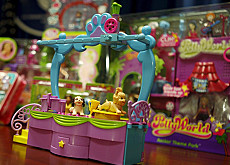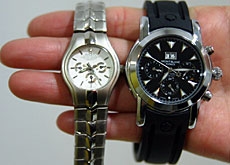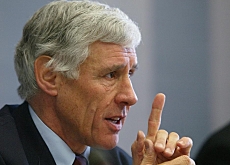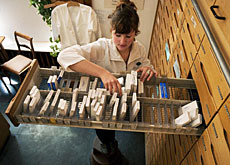Mattel recall takes toys out of kids’ pockets

US toymaker Mattel's worldwide recall of millions of Chinese-made toys has affected Switzerland – nearly 100,000 Polly Pockets and Doggy Daycares should be returned.
Tuesday’s recall came nearly two weeks after Mattel recalled 1.5 million Fisher-Price toys from around the world, which were also made in China.
The main problem in the recent case is that the toys contain tiny magnets that could be swallowed by small children. Around 600 die-cast “Sarge” cars have also been recalled in Switzerland because of risks associated with lead paint.
In particular, 46 Polly Pocket ranges, ten Doggy Daycare varieties and some Barbie accessories are caught up in the imbroglio.
Justifying the recall, Mattel CEO Robert Eckert said in a statement: “Child safety is our topmost priority and we wish to repeatedly apologise to all concerned.”
But Andreas Tschöpe, political expert at the Swiss Consumer Protection Association, told swissinfo that Switzerland had a poor record in the field of such recalls.
“Firms in Switzerland are not obliged to recall dangerous non-food products and the authorities have no power to intervene, unlike in the European Union,” Tschöpe explained.
On Thursday China said it would investigate and take harsh measures against makers involved in the recall.
A spokesman for the Ministry of Commerce stressed that China placed great emphasis on the safety of children but did not give any details about the companies, the investigation or potential punishments.
RAPEX system
Non-edible products, which have been classified as dangerous by the EU’s rapid-alert system, RAPEX, are often not considered a risk in Switzerland.
“This means that [such products] remain on the Swiss market, days, weeks or even months after a RAPEX alert [has been issued in the EU],” Tschöpe said.
The consumer protection expert explained that historical reasons were mostly to blame.
“Here, one says that the market can regulate itself, whereas in the EU… [it is said] norms are a necessity,” the political expert added.
Moves to change the law in Switzerland to make it closer to its European neighbours have been slow.
“There is a proposal on the table, but the industry is against it,” Tschöpe said.
The global recall of the affected Mattel products dwarfs that in Switzerland. The US company is pressing for the return of more than 18 million toys containing magnets and just over 430,000 Sarge cars.
The Chinese toy industry was reported to be worth $17.8 billion (SFr21.7 billion) last year. In Europe around 80 per cent of toys sold come from China.
swissinfo, Faryal Mirza
On August 2, toymaker Fisher-Price, which is owned by Mattel, recalled almost 1.5 million Chinese-made toys over fears that their paint contains too much lead.
The latest recall by Mattel, just two weeks later, involves 18.2 million toys globally, including 9.5 million in the United States, which contain magnets or magnetic parts that could be dislodged and swallowed by small children.
About 430,000 Pixar Sarge die-cast toy cars with lead paint were also recalled. Lead has been linked to health problems in children, including brain damage.
In Switzerland, 94,000 toys, mostly dolls and accessories by Polly Pocket and Doggy Daycare, were recalled.
RAPEX is the EU rapid alert system for all dangerous consumer products, with the exception of food, pharmaceutical and medical devices.
It enables the rapid exchange of information between European member states and the European Commission of measures taken to prevent or restrict the marketing or use of products posing a serious risk to the health and safety of consumers.
Both measures ordered by national authorities and measures taken voluntarily by producers and distributors are covered by RAPEX.
Once a week, the Commission publishes a weekly overview of the dangerous products reported by the national authorities (the RAPEX notifications). This is distributed to the 27 member states, as well as to Iceland and Norway, but Switzerland is not part of the system.

In compliance with the JTI standards
More: SWI swissinfo.ch certified by the Journalism Trust Initiative



You can find an overview of ongoing debates with our journalists here. Please join us!
If you want to start a conversation about a topic raised in this article or want to report factual errors, email us at english@swissinfo.ch.